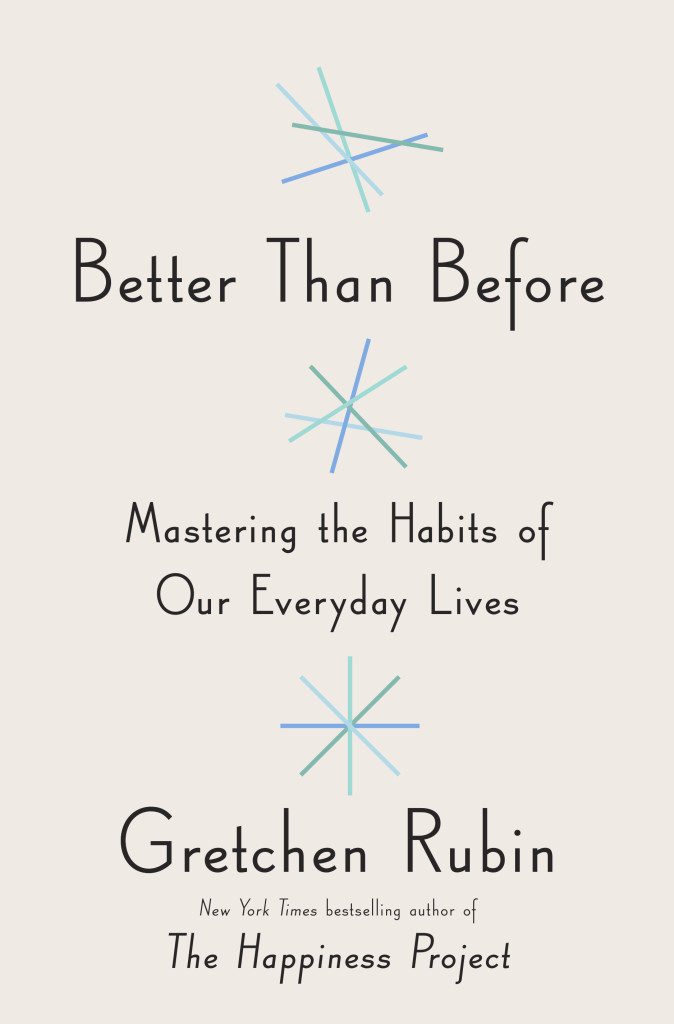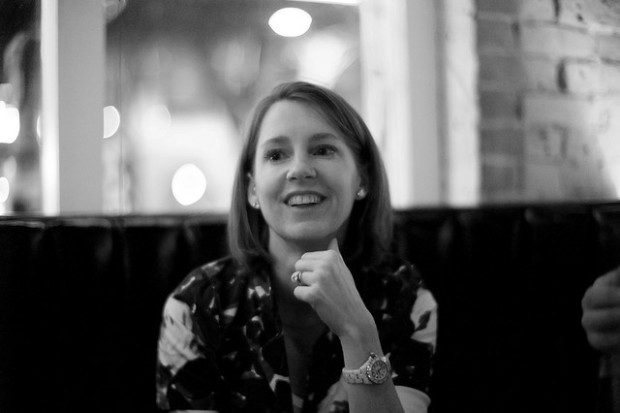(Author photo above is by Joi Ito // CC BY 2.0)
I really like Gretchen Rubin’s two previous books on happiness, The Happiness Project and Happier at Home. I was very excited to learn she was releasing a new book about habits: Better Than Before, and signed up to receive a review copy from the publisher. It’s out today, published by Random House.

I think the main reason I enjoy Gretchen’s work so much is that she’s a big advocate of self-knowledge – taking a deep, authentic look at your true preferences and personality to help shape changes that will improve your life. That might seem like an easy thing to do, but sometimes it’s not.
In Better Than Before, she uses this approach to help the reader learn how build habits. She focuses on helping us know ourselves better, to a deeper degree than any book or article on habits that I’ve previously read, and then shares a good variety of techniques based on our self-insights to think about and test out.
For example, one area I know myself well is that for most things I am an Abstainer, not a Moderator. If I want to make a change, I have to cut something out completely. Moderating doesn’t work for me. I quit drinking Diet Coke 10 years ago and haven’t had a sip since. Telling myself to drink “less” Diet Coke would never work for me – it’s too vague. Some people are the opposite – cutting themselves off completely makes them feel deprived, and then eventually they’ll fall completely off the wagon.
Gretchen also developed a framework for understanding how people respond to expectations. From her blog, here’s how it works:
“In a nutshell, it distinguishes how people tend to respond to expectations: outer expectations (a deadline, a “request” from a sweetheart) and inner expectations (write a novel in your free time, keep a New Year’s resolution). Your response to expectations may sound slightly obscure, but it turns out to be very, very important.
– Upholders respond readily to outer and inner expectations
– Questioners question all expectations; they’ll meet an expectation if they think it makes sense–essentially, they make all expectations into inner expectations
– Obligers meet outer expectations, but struggle to meet expectations they impose on themselves
– Rebels resist all expectations, outer and inner alike”
If you’re not sure what category you are (the book gives much more detail that makes it pretty easy to identify what you are while reading), she’s launched an online quiz you can take. According to Gretchen, these tendencies play a huge role in habit formation, and we need to understand our own tendency to help build the right approach.
I am a Questioner. This means that it’s pretty easy for me to meet inner expectations. When I set out to form a habit, if it’s truly important to me, I often have pretty good success at it. (Like the Diet Coke example.) But not always.
I guess the true test of a book about habits is how well it can actually impact your life. Since I read most of this book in November, I’ve had several months to try out the techniques in the book, and can report on their success.
Example 1:
For years I have struggled with flossing regularly. I know the importance, I just didn’t do it with any sort of regularity. I would randomly (ok, mostly just after visiting the dentist) think “I should floss more.” When I started Gretchen’s book back in November, I decided flossing every night was the first habit I wanted to try to adopt. It seemed like a good one to try out – something I’ve struggled with for years, but also something relatively simple that doesn’t take up a ton of time. I changed my language and mindset from “I should floss more” to “I floss, every night before bed.” I removed the question from my head – it’s just something I did, just as sure as I always brushed my teeth and washed my face. I used the Strategy of Monitoring to check off of a box on a spreadsheet every night that I flossed for the first two months (the huge nerd in me loves to check off boxes). The monitoring strategy worked for the first two months to build the habit, and after that I didn’t need to track it anymore, I just did it. The one or two nights during months 3 and 4 that I was really tired while getting ready for bed and the thought of not flossing crossed my mind I just thought “Nope, I floss every night. It’s what I do.” And that did it – I flossed. And afterwords I was happy that I did not put a crack in my habit that could have lead to its destruction. It’s now 5 months later and I’m still flossing every single night.
Example 2:
This is the big one. The one habit I’ve struggled with for years to maintain regularly. I’ve always been incredibly sporadic about going to the gym. I used to think “I should go to spin class today – it’s good for me.” That thinking was flawed because there are all sorts of things I don’t do that are good for me. It was enough of a good reason to make me wish I went to the gym more often, but not a strong enough reason that it got me out of my apartment every single time.
To change this, I made myself think about why I really wanted to go to the gym. One day it hit me: I want to go to the gym regularly because I feel amazing when I do. I feel great when I go regularly, but I also feel good after each individual visit. That was the real reason. That’s what I needed to keep in the front of my mind to successfully build this habit. In the few hours leading up to when I’m scheduled to go to spin class or to the gym, instead of letting myself think “It’s good for me, I should go.” I think “I am going to feel so amazing after I go, and so glad that I went.”
When I thought “I should go” – my brain always followed it with “but I don’t want to go.” When I think “I am going to feel so good after I go.” – well… I can’t argue with that. It’s true every time. It’s also changing my thoughts from negative to positive, which helps with anything we want to achieve.
So what have I learned about myself from Better Than Before? Two hugely important things:
- As a Questioner, I have success at sticking to habits when the reason for following them resonates with me. Better Than Before helped me realize just how much I rely on my inner monologue when making decisions.
- For my flossing habit, changing the language in my head at night from “I should floss.” to “I am a person who flosses every single night.” made an astonishing difference.
- For my gym habit, it made an even bigger difference. Changing my thinking before going to “You are going to feel so good after you go and be so glad that you didn’t skip it.” was what finally worked. I can’t argue with that – it’s true every single time.
- I like to check things off a list. I’m a huge organization nerd. The Strategy of Monitoring works extremely well for me to build habits. (Along with the Strategy of Scheduling.) I’ve used it in a variety of different ways:
- I used a Google spreadsheet to monitor and log my habit formation for things like flossing daily, which I eventually discontinued once I didn’t need it anymore (and the habits didn’t lapse).
- For a few things, like remembering to take a fish oil pill every day, I use a recurring To Do reminder on Teux Deux – the app that organizes my entire life. I like checking it off every evening.
- For my gym habit – I use my planner. I map out my weekly gym/exercise plan every Sunday, and after each visit I get to put a check mark in my planner to show I completed it. Every Sunday I also review how I did the previous week.
If you’re looking to be more successful at building habits, reading Better Than Before is a great place to start. You can also get exposure to Gretchen’s techniques for knowing yourself better on her blog or new podcast.
//
I’m currently in South America traveling, but would love to discuss Better Than Before and habits! Have you read Better Than Before, or Gretchen’s other books on Happiness? What habits do you struggle with maintaining? If you want to join the conversation please leave a comment and I will reply as soon as I can!

I have this book on my shelf and after reading your review I definitely want to get to it! Thanks! I need to work on some forming some better habits and will take whatever help I can get.
I hope you enjoy it and find it helpful! It’s full of great ideas and strategies.
I read The Happiness Project this past December and already have made some changes, after being inspired by parts of this book. I really like your review and examples of how you applied it, especially changing your inner monologue – and saying, “this is what I do.” I have a few areas I need to try that technique for, though of course I would like to read the book as well to read more about the different strategies and understanding of what helps me make better habits.
Thank you! I hope you enjoy it!
I LOVE her books! I have been wanting to read better than before and now after reading your review I will put it at the top of my list!
Yay!! I hope you enjoy it!
I’m big on lists as well, mostly because I like the crossing off part. It’s amazing the great sense of relief you can get from dragging a line through some words.
Agree! Sometimes I add things I’ve done but forgot to put on the list to a list after I’ve done them, just so I can cross it off. Other times I’ll just add everyday things like “Shower” to a list, for the pleasure of crossing it off.